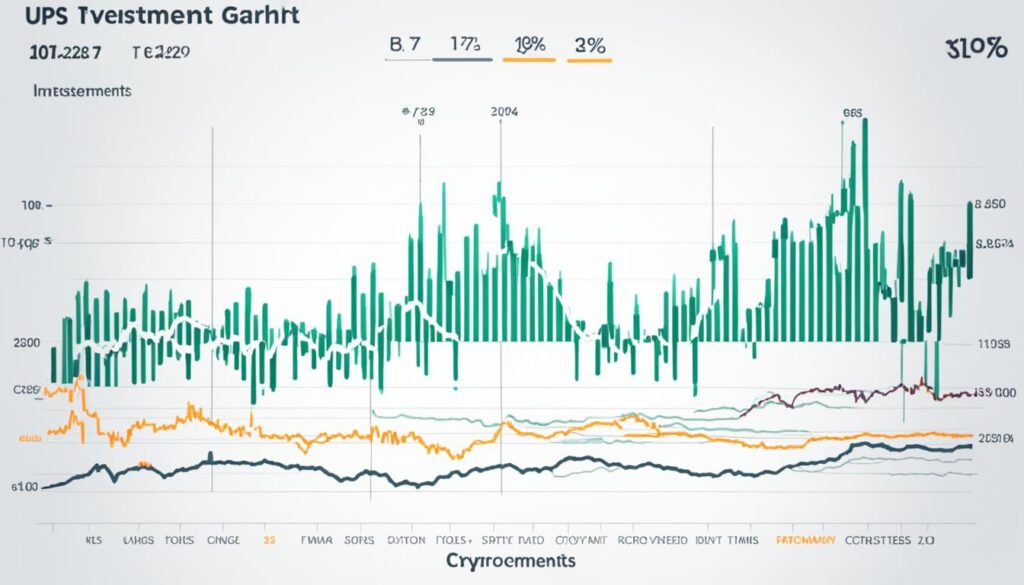
Did you know the global cryptocurrency market could hit $1.9 trillion by 2028? This growth is a big chance for new people to jump in and do well in the crypto world. This guide will give you the key knowledge and strategies to do well in crypto and reach your financial goals.
We’ll explore the basics of cryptocurrencies, like blockchain technology and popular exchanges. You’ll learn about making a good investment plan. We’ll also cover wallet security, decentralized finance (DeFi), and changing rules to help you make smart choices and avoid risks.
By the end of this guide, you’ll be ready to confidently step into the cryptocurrency world. You’ll be set for long-term success. So, let’s get started and explore the exciting world of digital finance!
Understanding Cryptocurrency Basics
Exploring the world of cryptocurrency is exciting. It’s a digital currency that runs on a blockchain network. This network is decentralized, meaning no government or bank controls it. Cryptocurrencies use cryptography to keep transactions safe and manage new units.
Blockchain is the tech behind cryptocurrencies. It’s a digital ledger that keeps track of all transactions safely and openly. Each transaction gets checked by computers, or nodes, and added to the blockchain. This makes the system trustworthy and reliable.
What is Cryptocurrency?
Cryptocurrency is a digital currency secured by cryptography. It doesn’t rely on a central bank or government. This makes it a decentralized option. Cryptocurrencies like Bitcoin and Ethereum are getting popular for being an alternative to traditional money.
How Does Blockchain Technology Work?
Blockchain is a digital ledger that spreads across many computers. When a transaction happens, it gets checked by nodes and added to the blockchain. This way, it keeps transactions safe, open, and resistant to tampering without needing a central authority.
| Cryptocurrency Basics | Blockchain Technology |
|---|---|
| Digital, decentralized currency | Distributed, tamper-resistant digital ledger |
| Secured by cryptography | Transactions verified by network nodes |
| Independent of governments or financial institutions | Eliminates the need for a central authority |
“Cryptocurrencies are a technological breakthrough, and the blockchain technology they are built upon will change the world.” – Marc Andreessen, co-founder of Andreessen Horowitz
Choosing the Right Cryptocurrency Wallet
Securing your cryptocurrency is key. Picking the right wallet is crucial. It’s important to know the different types of wallets to protect your investments.
Types of Cryptocurrency Wallets
Cryptocurrency wallets come in three main types: hot wallets, cold wallets, and hardware wallets. Each has its own benefits and drawbacks. Think about what you need and how much risk you can take on when choosing a wallet.
Hot wallets are easy to use and always online, but they’re more at risk from hackers. Cold wallets keep your private keys offline, giving you more security. But, they might be harder to use for everyday transactions.
For top-notch security, consider hardware wallets. These are physical devices that keep your private keys safe offline. They’re a top choice for keeping your cryptocurrency safe long-term.

Choosing the right wallet depends on your needs, how much risk you’re okay with, and the cryptocurrencies you own. Knowing the good and bad of each wallet type helps you make a smart choice. This way, you can better protect your digital wealth.
Exploring Popular Cryptocurrency Exchanges
As a newbie in the world of cryptocurrency, finding a reliable exchange is a key step. These online platforms let you buy, sell, and trade digital currencies like Bitcoin, Ethereum, and Litecoin. They are vital for buying and selling cryptocurrencies, making them crucial for your crypto journey.
Coinbase and Binance are two top exchanges you should know. Coinbase is easy to use, perfect for beginners. Binance is for those who want more trading options and a deeper experience.
When picking an exchange, think about security, fees, trading volume, and the number of cryptocurrencies they offer. Good exchanges like Coinbase and Binance focus on keeping your money safe. They use strong encryption and offer secure ways to store your digital money.
| Cryptocurrency Exchange | Key Features | Fees |
|---|---|---|
| Coinbase | – User-friendly interface – Secure storage – Wide range of cryptocurrencies | – 0.50% to 3.99% for buy/sell transactions – 0% to 0.50% for trading fees |
| Binance | – Advanced trading features – Large selection of cryptocurrencies – High liquidity | – 0.10% trading fees – Discounts available for users holding Binance Coin (BNB) |
Setting up an account on a cryptocurrency exchange might seem hard at first. But, most platforms have easy guides to help you. After setting up your account, you can look at different cryptocurrencies and make your first trades.
Developing a Solid Investment Strategy
Starting in the world of cryptocurrency means you need a strong investment plan for success. I’ll share key ideas on diversification, managing your portfolio, and the benefits of dollar-cost averaging. These tips will help you make smart choices for your investments.
Diversification and Portfolio Management
Diversification is key to handling risks and making your cryptocurrency portfolio strong. By spreading your investments across different digital assets, you lessen the effect of market ups and downs. It’s also vital to check and adjust your investments often to match your goals and how much risk you can take.
Dollar-Cost Averaging
Dollar-cost averaging is a smart move for new crypto investors. It means putting the same amount of money into crypto at set times, no matter the price. This strategy helps you ride out market changes and avoid making decisions based on emotions.
| Key Benefits of Dollar-Cost Averaging | Potential Drawbacks |
|---|---|
| Reduces the impact of market volatility | May miss out on potential gains during a bull market |
| Promotes disciplined portfolio management | Requires consistent financial commitment |
| Eliminates the need for market timing | May result in a lower average purchase price |
Using these strategies, you can create a diverse and managed cryptocurrency portfolio. This portfolio will meet your financial goals and fit your comfort with risk.

How Newbies Can Enter and Succeed in the Cryptocurrency World
Entering the world of cryptocurrency can seem tough at first, but it’s easier than you think. Start with a strong base and build your knowledge and skills over time.
First, take time to understand the fundamental concepts of cryptocurrencies and blockchain technology. Knowing the basics will help you make smart choices and navigate the market better.
Then, pick a user-friendly cryptocurrency wallet that fits your needs and security level. This will be where you keep your digital money, so choose carefully.

When you’re ready, look at different cryptocurrency exchanges to find the best one for your investment plan. Think about security, fees, and the cryptocurrencies they offer.
Creating a good investment plan is key. Diversification and dollar-cost averaging are great ways to manage risk and deal with market ups and downs.
Success in cryptocurrency isn’t about quick wins; it’s about being patient, disciplined, and eager to learn. Embrace the learning process, stay updated, and trust the journey. With the right attitude and tools, you can enter and succeed in this exciting world.
Risk Management in Cryptocurrency Investing
Investing in cryptocurrency can be tricky because of its ups and downs. If you want to do well, you need to know how to handle risks. It’s important to understand the market’s ups and downs and how to lessen your losses.
Understanding Volatility
Cryptocurrency markets change a lot, with prices going up and down quickly. This can be exciting or scary for new investors. Knowing what affects the market, like news and rules, can help you deal with risks better.
Others also read this article : Cryptocurrency Trading Methods to Stay Profitable in Bear Markets
Setting Stop Losses and Take Profits
Using stop losses and take profits is a smart way to manage risks in crypto investing. Stop losses sell your assets when their price falls to a certain point to prevent big losses. Take profits sell your assets when they reach a certain price to lock in gains and protect your money. These strategies help you handle the risks of the volatile crypto market.
| Risk Management Tool | Description |
|---|---|
| Stop Losses | Automatically sell assets to limit potential losses when prices drop to a predetermined level. |
| Take Profits | Sell assets to lock in gains when prices reach a pre-set target, protecting your capital. |
Understanding volatility and using stop losses and take profits can make you a better investor. This approach helps you make more informed decisions and increases your chances of success over time.

Navigating Altcoins and Initial Coin Offerings (ICOs)
The world of cryptocurrencies goes beyond Bitcoin and Ethereum. Altcoins offer many investment chances for those wanting to dive deeper into crypto. But, it’s important to be careful when looking at altcoins and Initial Coin Offerings (ICOs).
Evaluating Altcoin Projects
Before investing in altcoins, it’s key to check out the project and its future potential. Look for altcoins with a strong team, a clear purpose, and a solid plan. Check the tech, how fast it’s being used, and where it stands in the market compared to others.
Read the project’s white paper, check its social media, and see how active its community is. This helps you understand what makes it special.
| Altcoin Project | Technology | Use Case | Market Position |
|---|---|---|---|
| Solana (SOL) | Proof-of-History consensus mechanism | Decentralized finance (DeFi), non-fungible tokens (NFTs), and scalable smart contracts | Ranked among the top 10 cryptocurrencies by market capitalization |
| Chainlink (LINK) | Decentralized oracle network | Bridging real-world data with blockchain applications | Widely adopted in the DeFi ecosystem |
| Polkadot (DOT) | Multichain protocol | Interoperability between different blockchains | Positioned as a leading player in the blockchain interoperability space |
By looking closely at altcoin projects, you can find good investments that fit your goals and how much risk you can take. This helps you move through the changing altcoin world with confidence.
“The key to success in the altcoin market is thorough research and a keen eye for identifying game-changing projects.”
The crypto world is always changing. Keeping up with the latest in initial coin offerings (ICOs) and altcoin evaluation is key to making smart investment choices.
Decentralized Finance (DeFi) and Its Opportunities
I’m thrilled to dive into decentralized finance (DeFi) and its chances for making money. DeFi is a fast-growing area that brings new financial services. It lets users make money and join in on the latest financial trends without needing banks or other middlemen.
DeFi stands out because it’s decentralized. This means it uses blockchain technology for better security and openness. This setup gives everyone access to defi opportunities. You can earn interest on your crypto or lend and borrow money in new ways.
| DeFi Opportunity | Description |
|---|---|
| Lending and Borrowing | DeFi platforms let you lend your crypto and earn interest, or borrow money using your crypto as collateral. |
| Yield Farming | By adding liquidity to DeFi projects, you can earn more crypto tokens. These tokens can be used to increase your earnings. |
| Decentralized Exchanges (DEXs) | DeFi-powered DEXs let you trade cryptocurrencies directly with others, without needing a central exchange. |
Exploring defi opportunities shows me the power of financial freedom and innovation. By using decentralized finance, I can find new ways to grow my crypto investments. This is the future of finance.

“The beauty of DeFi is that it puts the power back in the hands of the people, allowing anyone with an internet connection to access a wide range of financial services.”
Staying Updated on Crypto Regulations
The world of cryptocurrency is always changing. It’s key to keep up with new rules. Understanding crypto regulations helps you make smart choices and follow the law.
Understanding Tax Implications
Crypto regulations also cover tax rules. Each country has its own way of taxing crypto. It’s vital to know the rules where you live.
In the U.S., the IRS sees cryptocurrencies as property. This means you have to pay taxes on profits or losses from selling or trading them. It’s important to report your tax implications right on your taxes to avoid trouble.
| Cryptocurrency Transaction | Tax Implications |
|---|---|
| Buying and holding cryptocurrencies | No immediate tax consequences, but gains or losses will be taxed when the cryptocurrencies are sold or exchanged. |
| Selling cryptocurrencies for fiat currency | Gains or losses are subject to capital gains tax, depending on the holding period and your tax bracket. |
| Using cryptocurrencies to purchase goods or services | Each transaction is treated as a sale, and any gains or losses must be reported on your tax return. |
Keeping up with crypto regulations and tax rules is key. It helps you follow the law and avoid legal or financial trouble.
Securing Your Cryptocurrency Assets
As a cryptocurrency enthusiast, I know how vital it is to keep your digital assets safe. Your wallet’s security is key because it’s where you keep your cryptocurrency. It’s important to protect your money from hackers and theft to do well in the crypto world.
Importance of Wallet Security
Your wallet is the door to your assets. It’s crucial to pick a secure wallet that fits your needs and how much risk you can handle. Hardware wallets like Ledger or Trezor are very secure because they keep your private keys offline. This makes it hard for hackers to get to your money.
Cold storage solutions, where your coins are kept in a device offline, offer even more protection against online threats.
Best Practices for Protecting Your Funds
Using a secure wallet is just the start. There are more steps you should take to keep your cryptocurrency safe. These include turning on two-factor authentication, backing up your wallet regularly, and keeping your recovery seed words safe. Don’t use public Wi-Fi to access your wallet, and be careful of phishing scams to avoid unauthorized access to your money.





